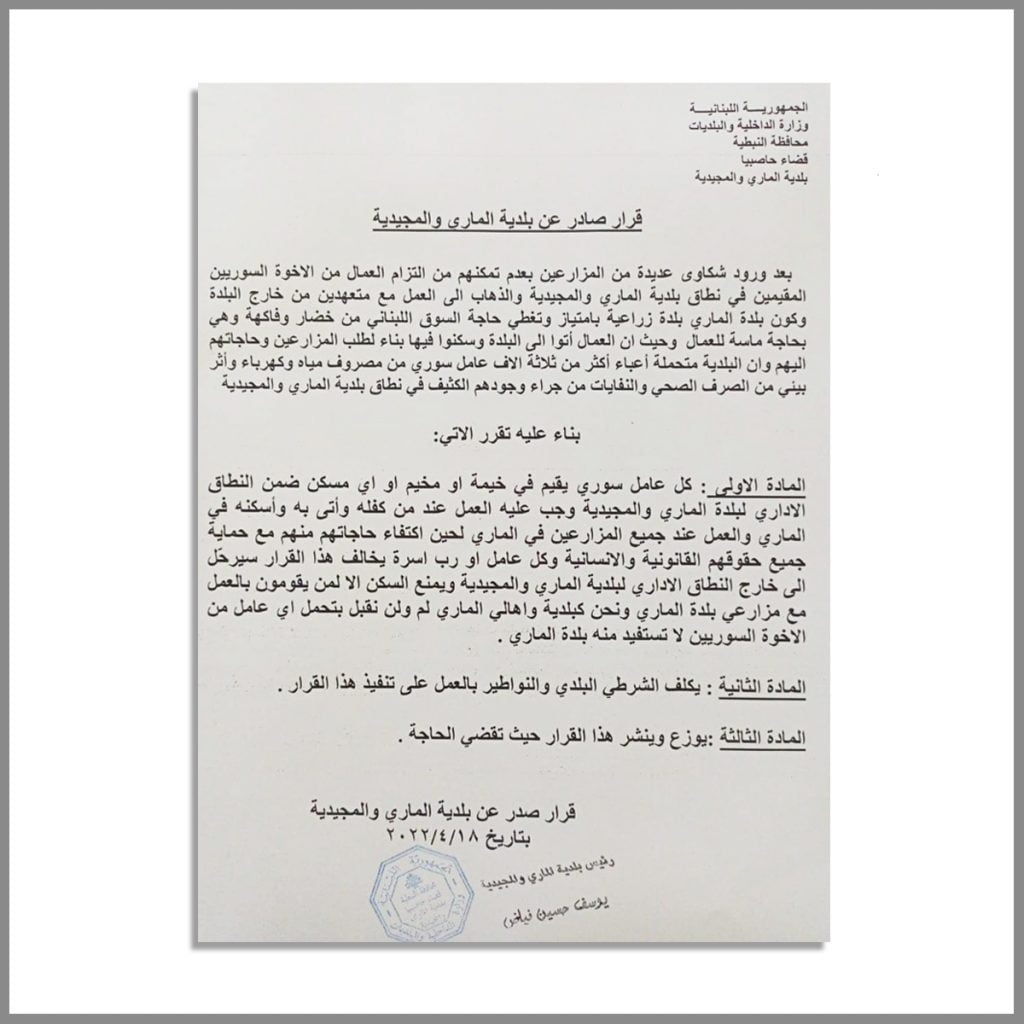يحتار رئيس بلدية الماري والمجيدية (قضاء حاصبيا) يوسف فياض، ماذا يريد أن يفعل باللاجئين/ات والعمال/ات السوريين/ات. فبعد أن فرض عليهم/ن الحجر في بداية شهر آذار الماضي، ملفقاً قراراً قضائياً، نتيجة اشتباهه بإصابة عائلة سورية بالكوليرا (تبيّن لاحقاً أنها تعرضت لتسمم عذائي، ولم يعتذر أو حتى يوضح)، قرر في 18 نيسان الحالي فرض عليهم/ن نظام عمل استغلالي إلى أقصى الحدود.
ووفق قرار فياض، فإن «كل عامل سوري يقيم في خيمة أو مخيم أو أي مسكن ضمن النطاق الإداري لبلدة الماري والمجيدية وجب عليه العمل عند من كفله وأتى به وأسكنه في الماري والعمل عند جميع المزارعين في الماري لحين اكتفاء حاجاتهم منهم مع حماية جميع حقوقهم القانونية والإنسانية. وكل عامل أو رب أسرة يخالف هذا القرار سيرحل إلى خارج النطاق الإداري لبلدية الماري والمجيدية ويُمنع السكن إلا لمن يقومون بالعمل مع مزارعي بلدة الماري. ونحن كبلدية وأهالي الماري لم ولن نقبل بتحمل أي عامل من الأخوة السوريين لا تستفيد منه بلدة الماري».
وجاء هذا القرار الاستغلالي «بعد ورود شكاوى عديدة من المزارعين بعدم تمكنهم من التزام العمال من الأخوة السوريين المقيمين في نطاق بلدية الماري والمجيدية والذهاب إلى العمل مع متعهدين من خارج البلدة (…) وحيث أن العمال أتوا إلى البلدة وسكنوا فيها بناء لطلب المزارعين وحاجاتهم إليهم وأن البلدية متحملة أعباء أكثر من ثلاثة آلاف عامل سوري من مصروف مياه وكهرباء وأثر بيئي من الصرف الصحي والنفايات من جراء وجودهم الكثيف في نطاق بلدية الماري والمجيدية».
يذكر أن بدل ساعة العمل الواحدة، الذي يتقاضاه العامل/ة السوري/ة في البلدة، يتراوح بين 30 و40 ألف ليرة لبنانية.

The municipality of Al-Mari and Al-Majidiyah regulates the exploitation of Syrian workers
The president of the municipality of Al-Mari and Al-Majidiyah (Hasbaya district), Youssef Fayyad, is puzzled over what he wants to do with Syrian refugees and workers. After imposing a quarantine on them at the beginning of last March, fabricating a judicial decision, as a consequence of his suspicion that a Syrian family had contracted Cholera (it turned out later that they were diagnosed with food poisoning, but he is yet to apologize or explain), he decided on the 18th of April to impose an extremely exploitative labor system on them.
According to Fayyad’s decision, “every Syrian worker who resides in a tent, a camp, or any house within the administrative territory of the towns of Al-Mari and Al-Majidiyah must work for his sponsor (Kafeel), who got him here, and housed him in Al-Mari, and must also work for all the farmers of the town until they no longer need them, taking into account the protection of all their legal and human rights. And every worker or head of a family who violates this decision will be deported outside this administrative area, where housing within it is only allowed for those who work for the farmers of the town of Al-Mari. And we, as municipality and people of Al-Mari, do not and will not accept to bear any worker from our Syrian fellows that the town of Al-Mari does not benefit from”.
This exploitative decision came “after numerous complaints from farmers that they were unable to control the commitment of workers from the Syrian fellows residing within the region of the municipality of Al-Mari and Al-Majidiyeh and them going to work with contractors from outside the town (…) After all, these workers came to the town and resided there due to the farmers’ requests, and to their need for them, and the municipality bore the burden of more than three thousand Syrian workers in terms of water and electricity expenses and the environmental impact of sewage and waste as a result of their heavy presence within the territory of the municipality of Al-Mari and Al-Majidiyyah”.
It is noteworthy that the allowance per one hour of work, which the Syrian worker receives in the town, ranges between 30 and 40 thousand Lebanese pounds.